We are moving to a new pagepublished at 04:37 GMT 6 December 2023
For technical reasons we are moving our live coverage of the war between Israel and Hamas to a new page. Please join us there.
Israel says its troops are in "the heart of Khan Younis" after bombarding the southern city overnight
The Israeli military report "the most intense day" of fighting since their ground operation began in late October
The resumption of fighting has intensified the hunger crisis in Gaza, the UN Food Programme says
According to the head of the Norwegian Refugee Council, the "pulverising" of Gaza ranks "among the worst assaults on any civilian population in our time and age"
The BBC has seen evidence of rape, sexual violence and mutilation of women during the 7 October Hamas attacks
The Hamas attack on southern Israel on 7 October killed 1,200 people, with around 240 others taken hostage
Hamas officials in Gaza say at least 16,248 people have been killed in Israel's retaliatory campaign, including about 7,000 children
Edited by Patrick Jackson
For technical reasons we are moving our live coverage of the war between Israel and Hamas to a new page. Please join us there.
 Paul Adams
Paul Adams
Diplomatic correspondent, reporting from Jerusalem
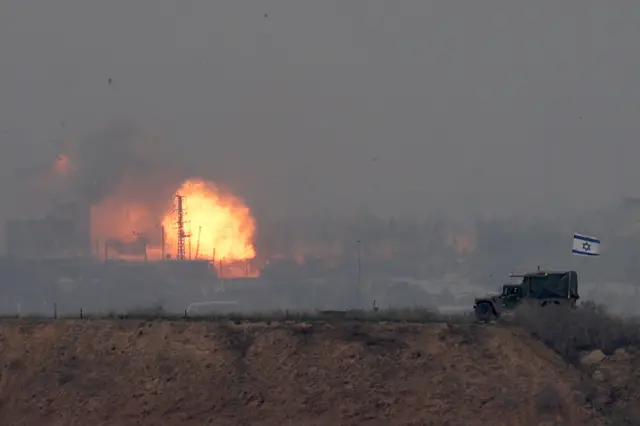 Image source, EPA
Image source, EPAAn Israeli jeep close to the Gaza boundary on Tuesday during an air strike
Israeli leaders say the battle for the southern Gaza Strip is well under way.
In a news conference this evening, the Defence Minister, Yoav Gallant, said what had already happened to Gaza City was now happening in Khan Younis.
With US officials starting to voice disquiet about Israel’s tactics, Prime Minister Benjamin Netanyahu had words for those he said were trying to pressure Israel: the only way to finish the job quickly was to use crushing force against Hamas. That approach is once again killing large numbers of civilians and sending others fleeing for safety.
In a meeting earlier with recently released hostages and the families of those still being held by Hamas, the prime minister found himself under attack.
In a leaked recording of the meeting, one former hostage, who hasn’t been identified, accused Netanyahu of putting politics above the safe return of the remaining 138 hostages. Her outburst was greeted with applause.
 Nadine Yousif
Nadine Yousif
BBC reporter, Toronto, Canada
University leaders address alleged campus antisemitism
The heads of three top US colleges have pushed back against claims that they are not doing enough to combat antisemitism on their campuses.
The leaders, who included Harvard president Claudine Gay, testified before the House of Representatives.
The students at the universities have accused administrators of not protecting Jewish people since the start of the Israel-Hamas war.
Jewish students said they faced antisemitic threats, assault and more.
In testimony to the House Committee on Education and the Workforce, Gay acknowledged a rising tide of antisemitism and Islamophobia on campus since 7 October, when Hamas attacked Israel, which responded with a bombardment of Gaza and ground offensive.
Israeli settlers who attack Palestinians in the West Bank will face targeted action against them according to the top US diplomat, Secretary of State Antony Blinken.
The US has announced a visa ban on Israeli extremists responsible for violence in the territory but added that the ban would also apply to Palestinians accused of violence.
The ban will affect "dozens" of extremist Israelis and some of their family members said state department spokesman Matthew Miller, who added that US law forbade the naming of any individuals.
Attacks have surged in the West Bank since the start of the war in the Gaza Strip, triggered by Hamas's assault on southern Israel on 7 October. In recent weeks Palestinians speaking to the BBC accused settlers of using the war in Gaza as an opportunity to seize land.
More than 700,000 Jewish people live in more than 250 settlements built since Israel's occupation of the West Bank and East Jerusalem in the 1967 Middle East war. The vast majority of the international community considers the settlements illegal under international law, though Israel and the US dispute this interpretation.
Israeli Prime Minister Benjamin Netanyahu has challenged the international community to speak out against the sexual assaults, rapes and mutilations alleged to have taken place on 7 October during the attacks by Hamas on Israel.
Addressing the nation, he said he expected all "civilised leaders, governments, nations to speak up against this atrocity".
“I say to the women's rights organisations, to the human rights organisations: you've heard of the rape of Israeli women, horrible atrocities, sexual mutilation - where the hell are you?" he said.
The BBC has seen and heard evidence of rape, sexual violence and mutilation of women during the 7 October Hamas attacks.
One man the BBC spoke to in Khan Younis says he is living in a house – comprising two rooms, a kitchen and a bathroom – that has 200 people in it, "all of them on top of each other".
He says that he cannot find food for his children, and that he has a baby on the way that he cannot buy nappies for. He adds that pharmacies and hospitals are "completely devoid of any medicines".
He adds:
Quote MessageThere is no safe place at all. Wherever you go, you will hear similar tragic stories."
Another man in Khan Younis says he has three young children that he struggles to feed.
"Everything is very expensive here whether milk, nappies or biscuits. I try to buy biscuits three times a day for my kids, but sometimes I fail even to secure such a simple thing," he says, adding that sometimes fights break out when trying to get water.
Five-year-old Hamas hostage returns to school and is hugged by classmates
A five-year-old Israeli girl has returned to school after being held hostage with her mother Daniele.
Daniele and Emilia were kidnapped on 7 October during a visit to stay with family in Kibbutz Nir Oz. They were two of 23 Israeli hostages released on 24 November.
In footage posted by Israel's ministry of education, she could be seen walking through the gates of her nursery before being surrounded by friends welcoming her and telling her they'd missed her.
Israel's battle for the southern Gaza Strip is under way, with its forces saying today has been "the most intense day" of fighting since its ground operation started in late October.
Here's a round-up of the latest developments:
Earlier we reported that a soldier in Lebanon was killed and three had been injured in an Israeli strike. The Israeli military has just released a statement on this, expressing its "regret over the incident".
It said IDF soldiers were acting in self-defence "to eliminate an imminent threat" identified from Lebanon.
"The threat was identified within a known launch area and observation point of the Hezbollah terrorist organization, near al-Awadi. Hezbollah’s activities in Lebanon are in clear violation of United Nations Security Council Resolution 1701," the IDF said on X. , external
"The Lebanese Armed Forces were not the target of the strike. The IDF expresses regret over the incident. The incident is under review."
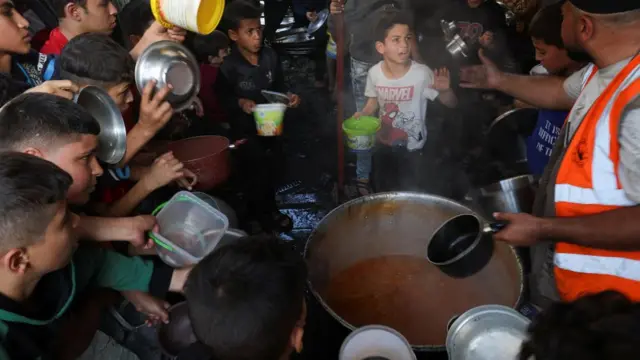 Image source, Reuters
Image source, ReutersPalestinians pictured getting their share of charity food offered by volunteer, 2 December
The resumption of fighting in Gaza has intensified the hunger crisis in Gaza, a UN aid agency said, as it called for a humanitarian ceasefire.
The United Nations World Food Programme (WFP) said it reached about 250,000 people during the seven-day pause in fighting that ended on Friday.
But it says the distribution of aid is now "almost impossible" and the continuation of the conflict "endangers the lives of humanitarian workers".
The WFP stressed that humanitarian workers "safe, unimpeded, and sustained access" to Gaza so it can "distribute life-saving assistance throughout the territory".
"WFP calls for a humanitarian ceasefire and urges all leaders to work with the utmost urgency to find political solutions that can end the suffering of families on all sides of this harrowing conflict," it said in a statement.
Rishi Sunak has expressed his "disappointment" over the breakdown of the temporary ceasefire in Gaza during a call with Israel’s Prime Minister Benjamin Netanyahu,
"The leaders discussed urgent efforts to ensure all remaining hostages are safely freed and to allow any remaining British nationals in Gaza to leave," a spokesperson for the UK PM added.
Sunak also told Netanyahu that "more humanitarian aid had to be allowed to enter Gaza, where civilians were in desperate need".
We can bring you more now from the briefing IDF spokesman Daniel Hagari gave earlier.
He says IDF soldiers are fighting in Khan Younis, which he calls the "Hamas stronghold in the southern Gaza Strip".
"The terrorists from Khan Younis played a significant role in the terrorist attack on 7 October, where they infiltrated Israeli territory, committed a massacre, and returned to the heart of Khan Younis," he says.
Hagari says the Israeli government now believes that there are 138 hostages "still being held in Gaza".
"It is our moral duty to bring back all the hostages home and to continue this effort at all times," he adds.
 Paul Adams
Paul Adams
Diplomatic correspondent, reporting from Jerusalem
There were furious scenes today when Israel’s prime minister, Benjamin Netanyahu, met newly released hostages and relatives of those still being held by Hamas in Gaza.
An audio recording of the rowdy meeting, obtained by Ynet, includes a lengthy tirade by one unnamed former hostage, whose husband is still in captivity.
She accused Netanyahu of putting politics above the return of the remaining 138 hostages.
"I saw [85-year old] Aryeh Zalmanovich die in front of me," she said. "And is that what you have to say, that you want to bring down the Hamas regime? That you want to show them who has bigger balls?"
The former hostage’s outburst was greeted with applause in the auditorium.
In the recording, Netanyahu can be heard telling the families "there is no possibility right now of bringing everyone home".
We reported earlier that Israel had said there'd be a pause in fighting in Rafah, near the Egyptian border, to allow aid to get into southern Gaza.
UNRWA, the UN Agency for Palestinian refugees, has since said it doesn't have the supplies it needs for new Gazans arriving in the city. (Israel has told people fleeing nearby Khan Younis to go there.)
It's not yet clear how much - if any - aid was allowed into Gaza during the brief pause earlier, which lasted until 14:00 local time (12:00 GMT). But in Rafah, people are struggling with limited access to water - and have spoken to Reuters while queueing at the only desalination plant in the area.
One displaced person says they regularly wait around three hours for whatever water they can get.
"This is the last station, water is 2km (1.2 miles) away. There is no washing, no food, no drinking. There are no medicines, no food," he tells the news agency, adding:
Quote MessageThe situation is very hard. We take a bath once a month. I am 63 years old, I am carrying the gallon on my shoulder for 2km just to get water."
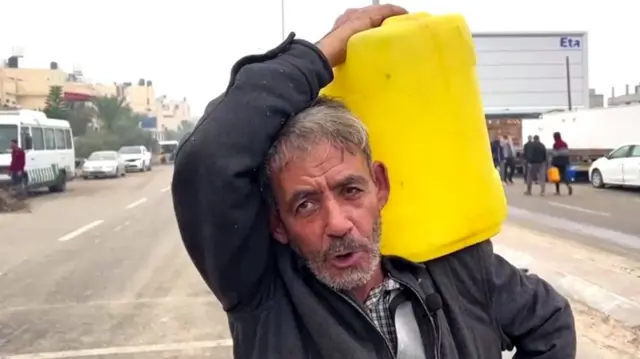 Image source, Reuters
Image source, Reuters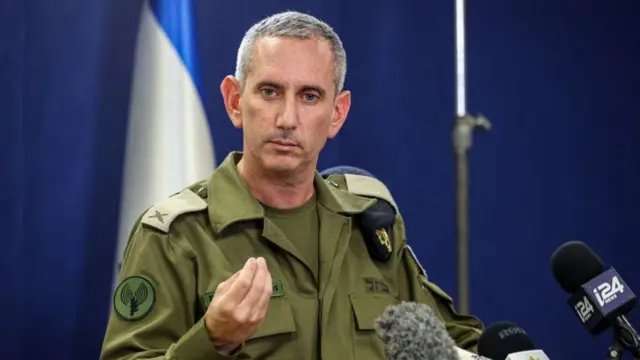 Image source, Getty Images
Image source, Getty ImagesWe've just heard from Daniel Hagari, a spokesman for the Israeli military, who says Israel is "determined to eliminate the [Hamas] terrorists and damage the infrastructure, as we did in the north of the Gaza Strip".
It comes hours after the Israel Defense Forces said its troops were in "the heart of Khan Younis", after bombarding the southern city overnight.
Hagari repeated some of the earlier statement, saying IDF troops are fighting "in the heart of Jabalia and in the area of Shejaiya".
"In each such stronghold, combined land and air attacks are carried out, underground infrastructures are destroyed, many terrorists are eliminated in face-to-face battles, and weapons are located," he adds.
In the early stages of the war, Palestinian civilians were told to flee south to avoid fighting. But Israel now says it believes parts of the region are being used by Hamas.
In Lebanon, the army there says one of its soldiers has been killed and three others wounded in an Israeli strike.
The United Nations Interim Force in Lebanon (Unifil) says Israeli shelling hit a military site in southern Lebanon, near the Israeli border.
The Israeli army has not commented on this specific strike but it earlier confirmed several exchanges over the border.
There've been almost daily skirmishes between Israeli forces and the Iranian-backed group Hezbollah, based in Lebanon, since the early stages of the war. The Lebanese army has not been involved in the clashes, though.
In a statement, Unifil says this is the first time a LAF [Lebanese Armed Forces] soldier "was killed during this critical period". It adds:
Quote MessageDuring the last days, we have seen a rapid and alarming increase in violence.
Quote MessageWe continue to urge those exchanging fire along the Blue Line to end the cycle of violence, which could lead to devastating consequences for people on both sides."
The US will cancel existing visas and future applications of those in the occupied West Bank who are found to have been involved in violent acts against civilians, be they "violent Israeli settlers" or "Palestinian extremists".
US State Department spokesman Matthew Miller gave details the new visa policy, saying there had been an "alarming surge in violent acts" against civilians in the West Bank since 7 October.
Miller said the Israeli government needed "to do more to stop extremist settler violence".
He said there had not been a "sufficient level of action" by Israel to hold violent settlers "properly accountable".
He also spoke of "Palestinian extremist militants" who were targeting Israeli civilians.
The visa policy starts today and Miller said it could apply to dozens of people, and their family members could also have visas revoked.
Miller said the US would target visas or applications from those who are "meaningly contributing to the undermining of peace, security or stability" of the West Bank.
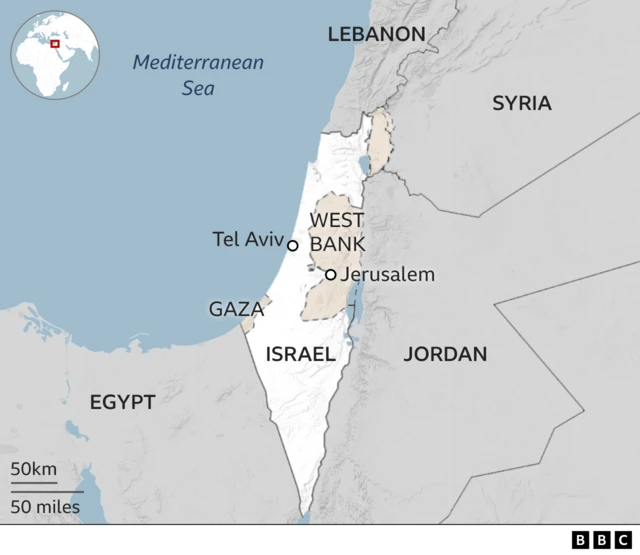 Image source, .
Image source, .After bombarding Khan Younis overnight, Israel says its troops are "in the heart" of the city.
Israeli authorities believe members of the Hamas leadership are hiding there.
Tens of thousands of civilians are in the city after fleeing fighting in the north and many are now heading further south to Rafah, where Israel has said there will be pause in fighting to allow aid into Gaza.
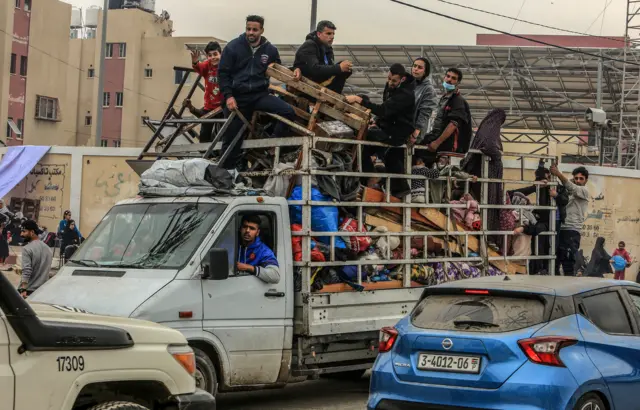 Image source, Getty Images
Image source, Getty Images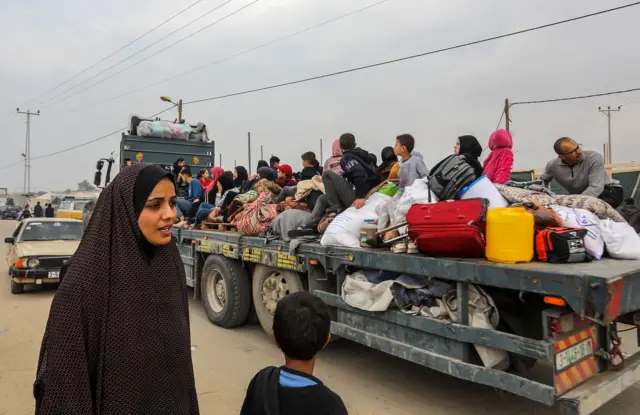 Image source, Getty Images
Image source, Getty Images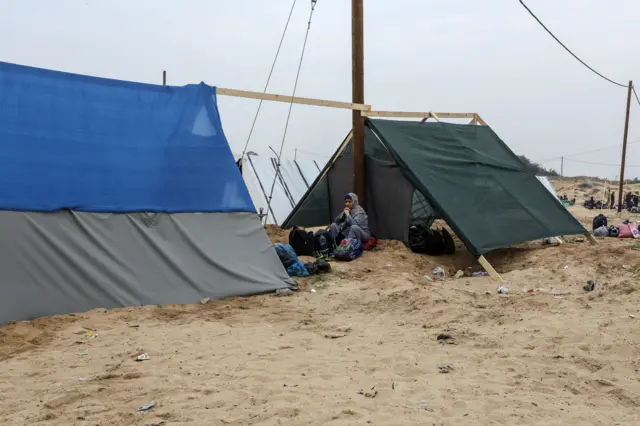 Image source, Getty Images
Image source, Getty Images Jeremy Bowen
Jeremy Bowen
International Editor
The Israelis have said that today was the fiercest fighting they've had since the start of the ground invasion and that they are now in centre of second biggest town in Gaza, Khan Younis.
There are people trying to move out of the path of the fighting and the UN is coming out with some of the most solemn and terrifying warnings we've heard from them so far about the massive humanitarian crisis that is undeniably taking place there. They're very concerned that they can't get to help the people who need it.
Israel's armed forces are now pushing further down the Gaza strip – the whole surface area of the strip is roughly the same as Isle of Wight – and more and more people are being pushed to the southern tip near Egypt.
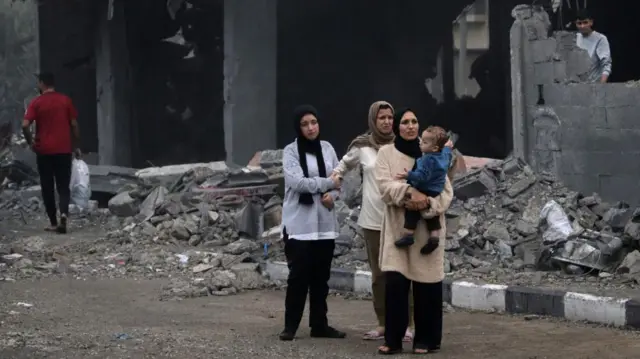 Image source, EPA-EFE/REX/Shutterstock
Image source, EPA-EFE/REX/ShutterstockPalestinians pictured making their way through the rubble following strikes on Deir al-Balah
Now the Egyptians are very, very concerned about the pressure of almost two million people in a very small area with not enough food or water, right on their border.
One of my colleagues has been in touch with a friend in Gaza today, who was saying: "I cannot go on. I cannot hear my children saying, 'dad I need food please' – and I have nothing to give them."
This is someone who has a job, with money, and if there was food available to buy he could afford it. But there is nothing to buy.
One thing the UN says is that Israel should allow commercial suppliers in to revive the market, so that at least those people with money can buy food and the relief supplies can go to someone who doesn’t have money.
We've just heard more from Hamas officials on the causalities in Gaza since its surprise 7 October attack on Israel.
Hamas's media office says at least 43,616 people have been injured and at least 7,600 people are missing.
Earlier, the Palestinian health minister said 3,200 Palestinians in the occupied West Bank have been wounded and 260 people have been killed, Reuters reported.